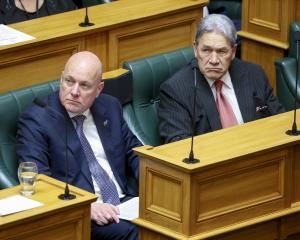

Over winter they endure stuff slopped up them from the kitchen sink and bench and detritus from the wild weather hurling itself against them from the outside.
To disguise/excuse my slovenly behaviour, I tell anyone who will listen (in other words, the cat) that the filth from this cleanliness lapse helps conserve heat. Yeah, right.
My kitchen windows, through which I like to survey the mess of the back garden and keep an eye on the cat keeping an eye on anything which might emerge from the compost bin, are eventually cleaned with old cloths from the inside. Attacking the outside is more complicated, involving ACC-claim-threatening balancing on the benchtop, leaning out one window with a wet and soapy hearth brush, followed by more leaning to throw bowls of water at the soapiness.
It makes me long for the simplicity of window cleaning in my childhood home, where window access was much easier. Then, scrunched-up wet newspaper followed by scrunched-up dry newspaper was the path to window wonder. (Google this now and you will see sites suggesting using a vinegar solution with the newsprint, to which I say, bah!)
Newspapers aiding transparency. Wow.
Newspapers are still keen on aiding transparency, as much as those who eschew old media in favour of the mayhem of social media, might want to believe otherwise.
It’s increasingly stressful being a daily newspaper journalist as newsrooms shrink and too many reporters deflect to the dark side — roles in communications/public relations.
Having issues with agencies’ adherence to the Official Information Act is a headache they could do without.
There’s still no date for the promised review of the Act. Attempts to beef up compliance have not addressed the regularity with which weary journalists put up with inadequate responses to run-of-the-mill inquiries where questions are ignored, or fudgy answers are given.
My regular readers will know of my ongoing battle for better transparency around aspects of the national bowel screening programme for participants.
There has been reluctance to be upfront about its limitations; that its initial test, with a threshold for the amount of blood found in your poo sample to turn up a positive result and trigger referral to a colonoscopy, is much less sensitive than that used in the pilot programme. This change means the national programme is expected to pick up a smaller proportion of cancers than the pilot did.
Because I know a negative result might mean blood’s been found but not enough for a positive programme result, on the two occasions I participated in the programme I requested my actual blood/poo reading, or numerical result, be sent to me and my general practitioner. I believe this might be useful information for my doctor should I present with possible bowel cancer symptoms between screenings.
Both times I made this request on the consent form sent to the lab with my sample. The first time this worked, but the second time, months after receiving my negative result, I only received the information after I queried where it was. I know of others whose similar lab form requests were also ignored.
In response to questions, Health New Zealand’s interim director of population health commissioning, Deborah Woodley, says the programme endeavours to respond to ‘‘any ad hoc written comments’’ made on consent forms, but because this is not the forms’ specific purpose it cannot be guaranteed that it will work.
Even though extra time was taken by Health NZ to enable a ‘‘proper response’’ to my OIA request, Ms Woodley did not answer my question about how ignoring the consent form requests might comply with the Privacy Act.
Ms Woodley says participants are encouraged to contact the National Co-ordination Centre (the programme’s operational hub) with any queries about bowel screening and ‘‘any requests for numerical results will be met’’.
You can see the Ministry of Health’s statement on results reporting on the National Screening Unit’s website, telling us we are not routinely given numerical results because it considers it might be confusing and potentially anxiety inducing.
But although there is a convoluted official process for getting these results, approved in 2018, and published in this newspaper and The New Zealand Herald in mid-2019, if there is anything on the website on this, I could not find it.
Most participants would not be aware of it, and my experience suggests GPs still haven’t been directly informed about it either. The only people who appear to have been specifically told about the process are those at the NCC who might have to deal with a request.
Such opacity makes my grimy winter windows seem crystal clear.
- Elspeth McLean is a Dunedin writer.












